Click on images to enlarge
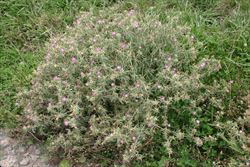
habit (Photo: Trevor James)

basal rosette of lower leaves (Photo: Jackie Miles and Max Campbell)
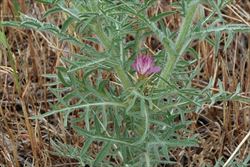
stems and deeply-divided leaves (Photo: Rob and Fiona Richardson)
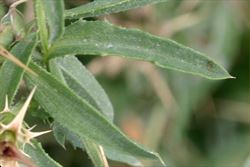
close-up of uppermost leaves with almost entire margins (Photo: Trevor James)
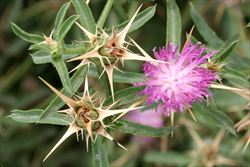
flower-heads (Photo: Trevor James)
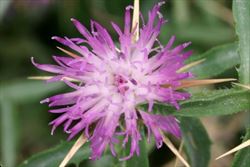
close-up of flower-head (Photo: Trevor James)
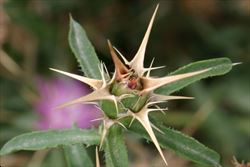
close-up of old flower-head showing spine-tipped bracts (Photo: Trevor James)
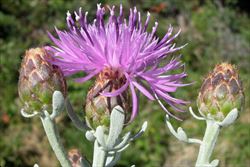
dusty miller (Centaurea cineraria), one of several similar species lacking spines on its leaves or flower-head bracts (Photo: Greg Jordan)
Scientific Name
Centaurea calcitrapa L.
Family
Asteraceae (Queensland, New South Wales, the ACT, Victoria, Tasmania, Western Australia and the Northern Territory)Compositae (South Australia)
Common Names
Augusta thistle, caltrop, caltrops, Chinese thistle, maize thorn, purple cockspur, purple star thistle, purple star-thistle, purple starthistle, red star thistle, red star-thistle, red starthistle, saucy Bob, star thistle, two-star thistle, uncommon star-thistle
Origin
This species is native to southern and western Europe (i.e. Czechoslovakia, Hungary, Switzerland, southern Russia, Ukraine, Albania, Greece, Italy, Romania, Yugoslavia, France, Portugal and Spain), the Madeira Islands, the Canary Islands, western Asia (i.e. Cyprus, Lebanon, Syria and Turkey) and northern Africa (i.e. Algeria, Egypt, Morocco and Tunisia).
Naturalised Distribution
A widely naturalised species that is largely found in the sub-coastal regions of south-eastern Australia. It is most common in the sub-coastal regions and southern parts of New South Wales, and relatively common in south-eastern South Australia and northern Victoria. Scattered populations are present in sub-coastal south-eastern Queensland, in southern Victoria, and in south-western Western Australia. It has also been recorded in Tasmania and the ACT.
Widely naturalised in other parts of the world, including southern Africa, New Zealand, the USA, Central America and South America.
Notes
This species is regarded to be an environmental weed or potential environmental weed in Victoria, New South Wales, South Australia, the ACT and Western Australia and is listed as a priority environmental weed in at least one Natural Resource Management region. It is primarily a weed of pastures, roadsides, wastelands, disturbed sites and cultivated areas in southern Australia, but also invades native grasslands, open woodlands, rangelands and conservation areas (e.g. Marino Conservation Park in South Australia).

